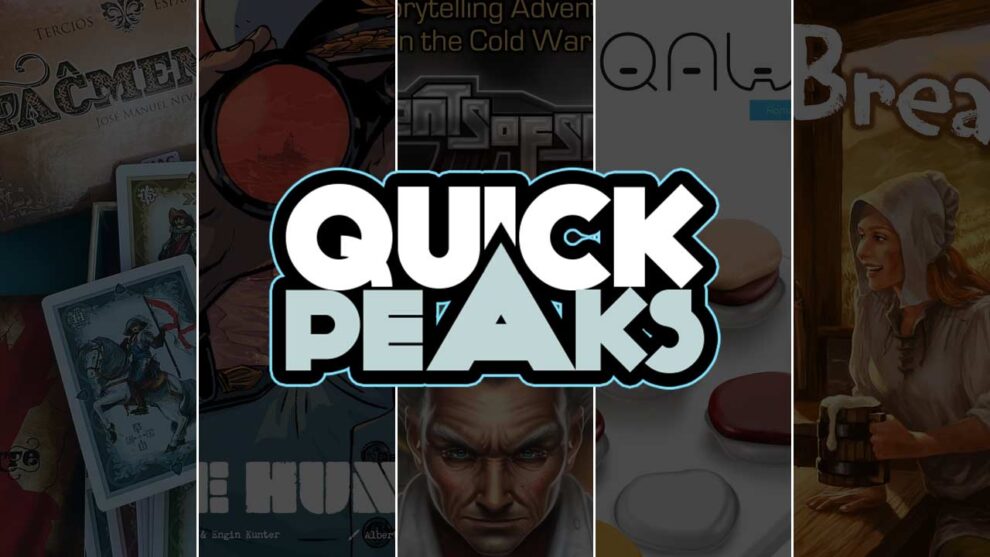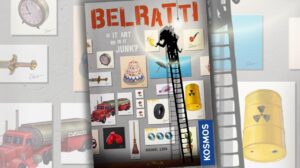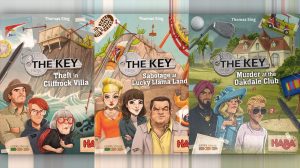Taĉmento – Justin Bell
An 18-card “wargame” in the vein of microgames from publishers like Button Shy Games and Matagot, Taĉmento arrives courtesy of NAC Wargames. Using objective cards to set up a series of puzzles, players will re-enact various conflicts from Spanish wars of the 16th century.
I use the word “re-enact” loosely, because Taĉmento is a fairly themeless deduction puzzle system in the solo mode. While Taĉmento also features a two-player version, I think it’s really a solo-only game, since two-thirds of the rulebook is dedicated to the Instruction (solo) mode and a seven-episode solo-only campaign. The game’s solo setup can be so random that even the rules admit that you might deal 12 cards to the table when setting up your scenario and win without playing a card.
That didn’t feel broken to me, but it does highlight issues with the design. I played Taĉmento a few times because games are short; I won on my first action on the game’s easiest mode, and on my third turn on medium. Moving from two to three objective cards flipped the script in a big way—I couldn’t scratch the thing with a full 12 turns to my credit. Despite these issues, Taĉmento is worth a look for a solo player who finds deduction games interesting and wants a puzzle filler to kick off a longer night of wargaming with friends.
Ease of entry?:
★★★★☆ – The odd bump or two
Would I play it again?:
★★☆☆☆ – Would play again but would rather play something else
Read more articles from Justin Bell.
The Hunt – Andrew Lynch
I had such hopes for The Hunt. Matthias Cramer is the designer behind Watergate, a standout entry in the crowded two-player market, and Salt & Pepper Games has been one of my favorite up-and-coming publishers over the last two years, with titles like Resist! and the frankly divine The Battle of Versailles to their name. That pedigree alone guaranteed The Hunt a spot on my Most Anticipated list for 2023.
The game itself is card-driven and asymmetric, set during WWII. The Nazis attempt to sink British ships sailing across the Atlantic, using an untraceable submarine and a warship. The UK strives to get those same ships across the Atlantic while attempting to track down and destroy the German forces. It’s a promising setup. The German player has to constantly make choices about revealing their location in exchange for furthering their goals, while the British player is just trying their best. In theory, it’s a great idea.
The reality is a little underwhelming, though it would be a stretch to say the game is bad. It’s fine, but the good kind of “It’s fine.” “It’s fine” with the “fine” said at a higher pitch than “It’s.” Not, to be clear, with a rising intonation. It’s not a question. “It’s fine?” No. It’s fine! You won’t have a bad time. You won’t have a great one, either. It’s, well, it’s fine.
Ease of entry?:
★★★★★ – No sweat
Would I play it again?:
★★☆☆☆ – Would play again but would rather play something else
Read more articles from Andrew Lynch.
Agents of SMERSH – K. David Ladage
I have a confession to make: I love the game Tales of the Arabian Nights. It is a game that is quite different from most other games you are likely to encounter. But, if I am being honest, it has some rough edges. OK, it has a lot of rough edges. From the scoring mechanism that feels random, to the skill system that appears to not really work as a skill system in any significant way. Regardless, I love the wild-and-crazy stories this game can generate.
Imagine my surprise when a friend of mine pulled out Agents of SMERSH (Epic Edition). It was less than a minute into the teach that I realized that this is Tales rethemed and turned into a cooperative game. It was about turn two when I realized that this is Tales re-written with the rough edges sanded down to a luxurious and smooth finish. It is Tales fixed. In a conversation with my friend after the game, he explained that the Epic edition corrected a few rough edges in the original. So, yea, it might have taken them a couple of tries to get it right, but it feels to me like they did. We played one game on easy mode. I need to play this again—soon!—on a higher difficulty.
If only Tales of the Arabian Nights could get a new edition taking into account those same rough edges…
Ease of entry?:
★★★★☆ – The odd bump or two
Would I play it again?:
★★★★★ – Will definitely play it again
Read more articles from K. David Ladage.
Qawale – Tom Franklin
Knowing my love for abstracts, my colleague and friend Justin Bell sent me his copy of Qawale last year. It’s another Gigamic game in their Q-named abstract game series, and Qawale fits right in with the other Q-games on my shelf.
Qawale is a Mancala-mechanic game played on a 4×4 grid. Players try to be the first to get four of their pieces in a row. On your turn, you’ll place a piece on top of a pre-existing stack, then picking up the entire stack, you’ll move orthogonally, dropping off the bottom piece on each space you pass over. Even though there are only 16 spaces and 8 pieces per player, the board shifts a lot after each turn. This means your well-thought out plan for victory can be wiped out before your next turn. (I write from experience.)
Qawale shares a lot of its DNA with Tak, another abstract I love. That being said, the strategies behind the two are very different. If you like one, though, you’ll likely enjoy the other.
Oh, and thanks again, Justin!
Ease of entry?:
★★★★★ – No sweat
Would I play it again?:
★★★★★ – Will definitely play it again
Read more articles by Tom Franklin.
Beer & Bread – Bob Pazehoski, Jr.
Regarding both the game and the subject matter, I say: what’s not to like? This two-player gem from Scott Almes is a lovely game of balance. Players use six ingredients to both bake bread and brew the brew. What’s spectacular is the way the game changes from round to round, creating a delightful web of relatively lightweight decisions. Plus, triple-use cards? Love it.
Play the cards as resources and they potentially compound, making each collection more lucrative than the last. Plus (and I love this more), resource cards come back to your hand in the seasons of plenty. When you want to finish a card but you’re not ready? Play it as a resource then take it up again to use during a dry season. Playing cards into stacked abilities is also a great way to keep a card from your opponent (so dirty). While it is possible to play the game in a very straightforward and friendly manner, there are some beautiful decisions to be made just below the surface.
My first play was with my ten-year-old son. He managed the game very well. Where it fell apart was in the balance aspect. Players only take the lowest score between beer and bread, creating a real need to discern efficient maneuvers for both delectables. Otherwise, Beer & Bread is entirely approachable for young and old. If you’re looking for a two-player experience, I think there’s much to love. (While you’re reading, check out Justin’s review of Beer & Bread.)
Ease of entry?:
★★★★★ – No sweat
Would I play it again?:
★★★★★ – Will definitely play it again
Read more articles by Bob Pazehoski, Jr.















Add Comment